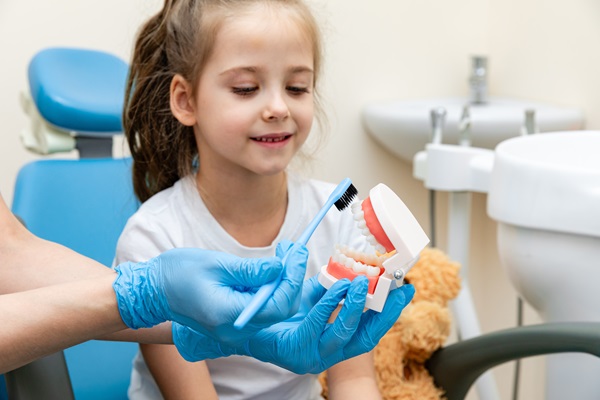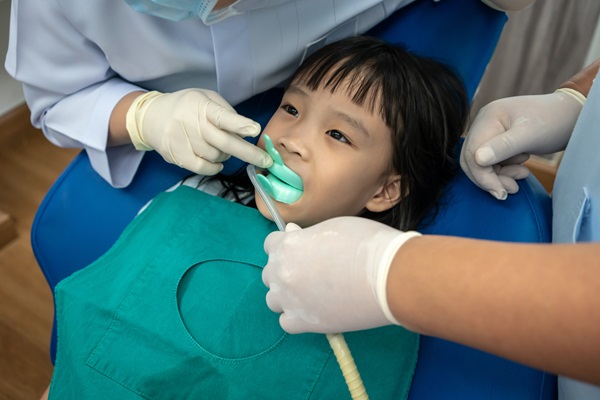Common Procedures Performed in Pediatric Dentistry

Pediatric dentistry addresses dental problems in children. Studies show that 20% of children, 5–11 years old, have one or more cavities. You should bring your child in for regular dental checks. That way, your child can get the right dental treatments early. Here are the common pediatric dentistry procedures that you should consider.
Dental sealants
This is a pediatric dentistry treatment for the chewing surfaces of the back teeth. These areas are prone to decay and damage. The constant exposure to foods allows bacteria and food particles to get stuck in the pits and grooves of these teeth. Pediatric dentistry can offer dental sealants to protect these young teeth. It is ideal to give the child this treatment when the molars erupt.
The dentist will clean the teeth first. Then, treat any cavities. The dentist will paint the sealants on the child’s back teeth. The liquid sealant hardens when it touches saliva. This extra layer of protection shields the back teeth from food particles and bacteria. The sealant can make cleaning the molars easier as well.
Fluoride treatment
This pediatric dentistry preventive treatment can strengthen the dental enamel. It can also protect the child’s teeth from bacterial acid damage. Kids love carbohydrate-rich foods. Harmful bacteria in the mouth thrive from consuming these sugars. Fluoride treatment can give children a fighting chance against dental decay and gum disease.
The child can get fluoride from the community water supply as well. Discussing fluoride supplements may be necessary if the child does not have access to fluoridated water. The dentist can apply fluoride treatment during a pediatric dentistry visit. Fluoride tablets may be an option depending on the assessment of the dentist and the attending children’s doctor.
Dental X-rays
The dentist can order dental X-rays during the child’s dental checkup. This is a pediatric dentistry diagnostic exam that tells the dentist the health status of hidden oral structures. The images can help the dentist keep an eye on the child’s dental development. This diagnostic exam is not harmful to children. The radiation is extremely low. The dentist will also provide protective garments for additional protection against radiation.
Dental extraction
The dentist may suggest dental extraction as a last resort. There could be an issue with cavities. Overcrowding is also a reason for removing at least one tooth. The dentist can also recommend this pediatric dentistry procedure if some baby teeth have not fallen out yet. Dental extraction can help the child’s permanent teeth grow properly.
Dental fillings
This is a common pediatric dentistry treatment. Kids are prone to cavities. Regular dental checks allow the dentist to spot early signs of cavities. Applying dental fillings can happen in one visit. Young patients with dental anxiety may need laughing gas for this pediatric dentistry treatment.
The dentist will drill out the decayed parts of the teeth first. Cleaning, disinfecting, and drying the areas will follow. The dentist will then fill the cavity with the preferred type of dental filling. Most parents choose porcelain or ceramic fillings. These tooth-colored fillings make the restorations undetectable. These fillings blend well with the patient’s natural teeth.
Dental cleaning
The dentist will provide this prophylactic pediatric dentistry treatment during dental visits. A professional dental cleaning can remove plaque and tartar from the child’s teeth. Regular dental cleanings can help prevent gum disease and dental decay. The dentist can apply fluoride to the child’s teeth after a thorough cleaning.
Stainless steel crowns
These dental restorations can protect the child’s back teeth. These pediatric dentistry restorations can also bring back teeth with severe decay. The dentist will cement the stainless-steel crowns on the baby molars. These restorations can prevent more decay or damage to these teeth until the permanent teeth erupt.
Interceptive orthodontic care
Orthodontic treatment can happen early in a child’s life. The dentist will check the child’s dental development. Regular dental visits will allow the dentist to pinpoint any dental alignment issues. If there is a possible malocclusion, the dentist will recommend interceptive orthodontic treatment. This pediatric dentistry procedure can realign the child’s bite and jaw during the formative years. It can prevent serious and expensive orthodontic treatments in the future.
Space maintainers
Baby teeth erupt and stay in the mouth until the permanent teeth erupt. Some kids lose baby teeth earlier than expected. The dentist will provide space maintainers to take the place of baby teeth. Each one will reserve the dental space until the permanent teeth erupt. These pediatric dentistry oral appliances can prevent neighboring teeth from shifting into the dental space. Space aligners can keep the natural teeth in place to prevent misalignment and bite problems.
Pediatric dentistry treatments can give your child a good start in dental health
Dental health can impact general health. That is why taking care of your child’s dental health is important at an early age. The mentioned common pediatric dentistry procedures can help maintain your child’s teeth and gum health. Working with your dentist can result in smoother, easier dental treatments.
Request an appointment here: https://nettsmiles.com or call Nett Pediatric Dentistry & Orthodontics at (623) 759-7658 for an appointment in our Phoenix office.
Check out what others are saying about our dental services on Yelp: Pediatric Dentist in Phoenix, AZ.
Recent Posts
Cavity treatment for kids is a chief concern among parents, and for a good reason. Cavities are common in children of all ages. According to the Centers for Disease Control and Prevention, over half of the kids ages 6 to 8 have had at least one cavity in a primary tooth. The good news is…
Pediatric dentistry focuses on the oral problems that occur in children. Many dental issues in kids are similar to those that occur in adults. Without proper treatment, dental problems can progress to misaligned teeth and poor oral health. If you want to maintain your child’s dental health, here are the common dental issues that pediatric…
In their early years, your youngster is still a novice in brushing and flossing their teeth, meaning that cleaning your child's teeth in that period is your responsibility. Cleaning the teeth is a skill that the child should learn. Your role is to educate your youngster on how to keep their mouths clean and healthy.…
When does my child need pediatric dentistry? This is a question that many parents often ask. The answer may vary depending on the opinion of the pediatric dentist. However, most pediatric dentists believe that a child should go to pediatric dentistry by their first birthday.A child needs to get used to the dentist at an…


